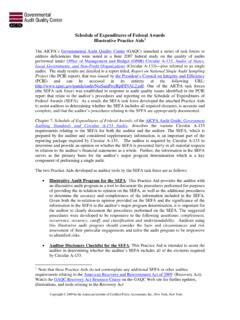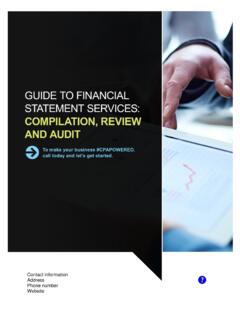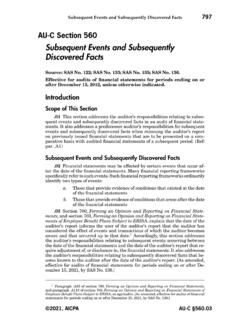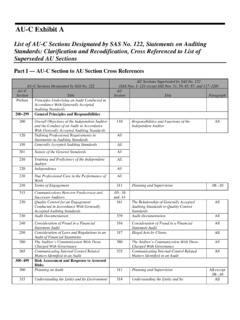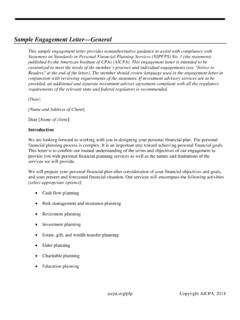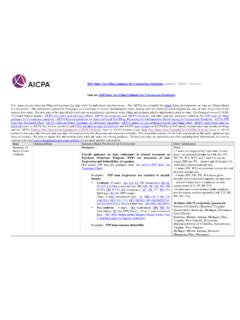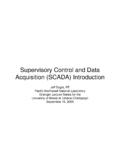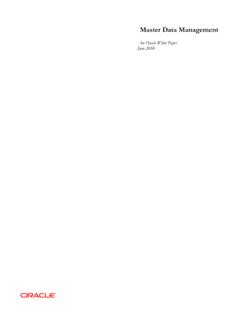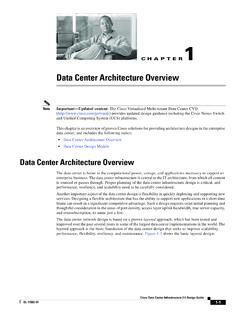Transcription of An Overview of Data Management - AICPA
1 An Overview of data Management Recognition of Contribution The AICPA gratefully recognizes the invaluable contribution and involvement from the AICPA s IMTA Executive Committee data Management Task Force in the development of this EC data Management Task Force John Barile, CPA, CITP Ernst & Young, LLPD oris Cantagallo, CPA, CITP CGMAM ichael Garber, CPA, CITP Garber Associates, Palomino, CPA, CITP Ernst & Young, LLPDan Schroeder, CPA, CITP Habif, Arogeti & Wynne, LLPD onny Shimamoto, CPA, CITP, CGMA IntrapriseTechKnowlogies LLCM ichael Smith, CPA, CITP McGladrey & Pullen, LLPS teve Ursillo Jr.
2 , CPA, CITP Sparrow Johnson & Ursillo Staff Janis Parthun, CPA, CITP, CGMA Senior Technical Manager, AICPA IMTA Division1 Table of ContentsWhat is data Management and Why is It Important? ..3 How Does data Management Compare to Information Management ? .3 What Are the Functions of data Management ? ..4 How Can an Organization Understand What data It Needs to Manage? ..5 How Does an Organization Know What data Are Important? ..6 How Does an Organization Document Its data ? ..6 What is data Governance? ..7 What Are the Functions of data Governance?.
3 7 What Are the Principles of data Governance? ..8 What AICPA Resources Are Available to Guide a data Management Initiative? ..92 data Management plays a significant role in an organization s ability to generate revenue, control costs and mitigate risks. Successfully being able to share, store, protect and retrieve the ever-increasing amount of data can be the competitive advantage needed to grow in today s business of data generally focuses on the defining of the data element, how it is structured, stored and moved. Management of information is more concerned with the security, accuracy, completeness and timeliness of multiple pieces of data .
4 These are all concerns that accountants are trained to assess and help manage for an organizations today are inundated with data , the volume of which is increasing at an alarming rate. It is vital, therefore, to determine which data are most relevant and essential from an enterprise-wide perspective. Identification and classification of the enterprise s critical data should be performed by a team of senior-level representatives from each line of business or department. These team members must have knowledge of the relevant contributing business systems and processes, and the requirements of their respective stakeholders, systems and processes, and the requirements of their respective stakeholders.
5 Primary data Management functions include: 1. data Governance 2. data architecture Management 3. data Development 4. Database Operations Management 5. data Security Management 6. Reference & master data Management 7. data Warehousing & Business Intelligence Management 8. Document & Content Management 9. Meta data Management 10. data Quality Management Accountants can play a key role in enabling data Governance, and ensuring that it is aligned with an organization s overall corporate governance processes.
6 data Governance principles include: 1. Integrity 2. Transparency 3. Auditability 4. Accountability 5. Stewardship 6. Checks-and-Balances 7. Standardization 8. Change Management Accountants already are familiar with applying many of the principles above to the financial data that they work with in a regular basis. Becoming involved in a data Management or data governance initiatives provides the opportunity to apply these principles into other parts of the document provides an Overview to help accountants understand the potential value that data Management and data governance initiatives can provide to their organizations, and the critical role that accountants can play to help ensure these initiatives are a success.
7 Executive Summary31 The DAMA Guide to the data Management Body of Knowledge (DAMA-DMBOK), 1st Edition 2009, is data Management and Why is It Important?The definition provided by the data Management Association (DAMA) is: data Management is the development, execution and supervision of plans, policies, programs and practices that control, protect, deliver and enhance the value of data and information assets. 1 data Management plays a significant role in an organization s ability to generate revenue, control costs and mitigate risks. Successfully being able to share, store, protect and retrieve the ever-increasing amount of data can be the competitive advantage needed to grow in today s business customer data results in improved customer relationships, which ultimately drives revenues.
8 While expanded data storage requirements have increased equipment investments; there also are many other hidden costs associated with data Management . Some of these costs include power consumption, cooling requirements, installation, cabling, backup Management and data recovery. Inherent within all of these costs is the need for more time and space leading to increases in payroll and occupancy , but just as important, data Management plays a key role in helping an organization mitigate risks. For example, establishing a formal data retention policy can help decrease storage costs and reduce litigation Does data Management Compare to Information Management ?
9 data are just facts. In IT processes, data are generally represented as content in a field. data , for example, can be the amount of money for a check, a bank balance or an amount for an income statement or balance sheet account. data become information when they are structured to provide context and meaning. Information for a payment is the combination of the data for the amount paid, date of the transaction, bank account charge and the of data generally focuses on the defining of the data element and how it is structured, stored and moved. Management of information is more concerned with the security, accuracy, completeness and timeliness of multiple pieces of data .
10 These are all concerns that accountants are trained to assess and help manage for an Ibid., Are the Functions of data Management ? Per DAMA, the following are 10 primary functions related to a comprehensive data Management program2: 1 data Governance: The exercise of authority, control and shared decision-making (planning, monitoring and enforcement) over the Management of data assets (See What is data Governance? on page 6 for more detail) 2 data architecture Management : The development and maintenance of enterprise data architecture within the context of all enterprise architecture , and its connection with the application system solutions and projects that implement enterprise architecture 3 data Development.
